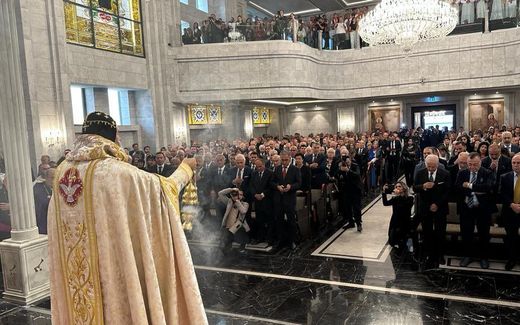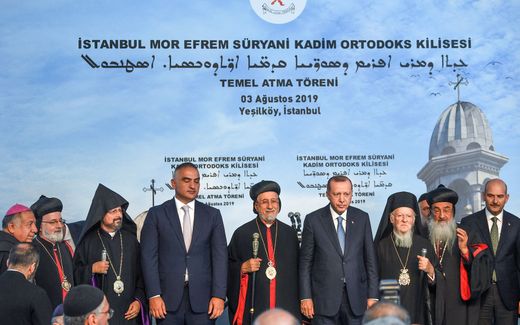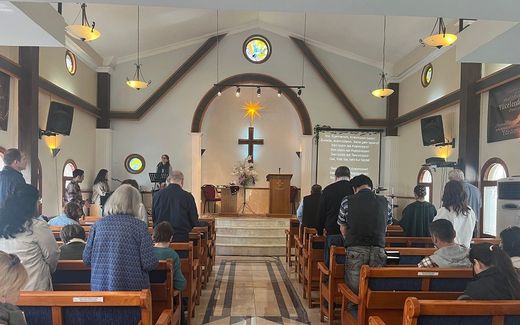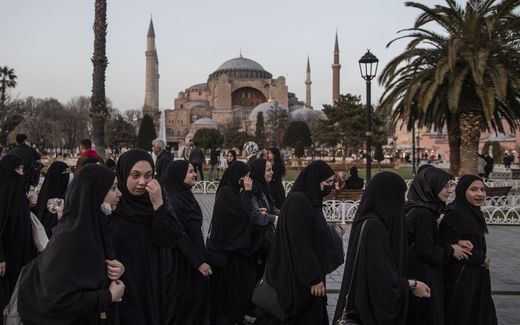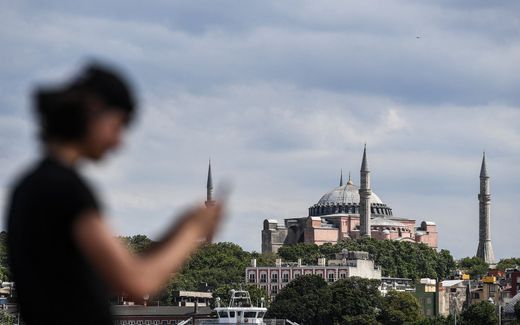A police officer coined the name for Turkey's fast-growing Protestantism
10-10-2024
Southern Europe
Kees van den Brink, RD
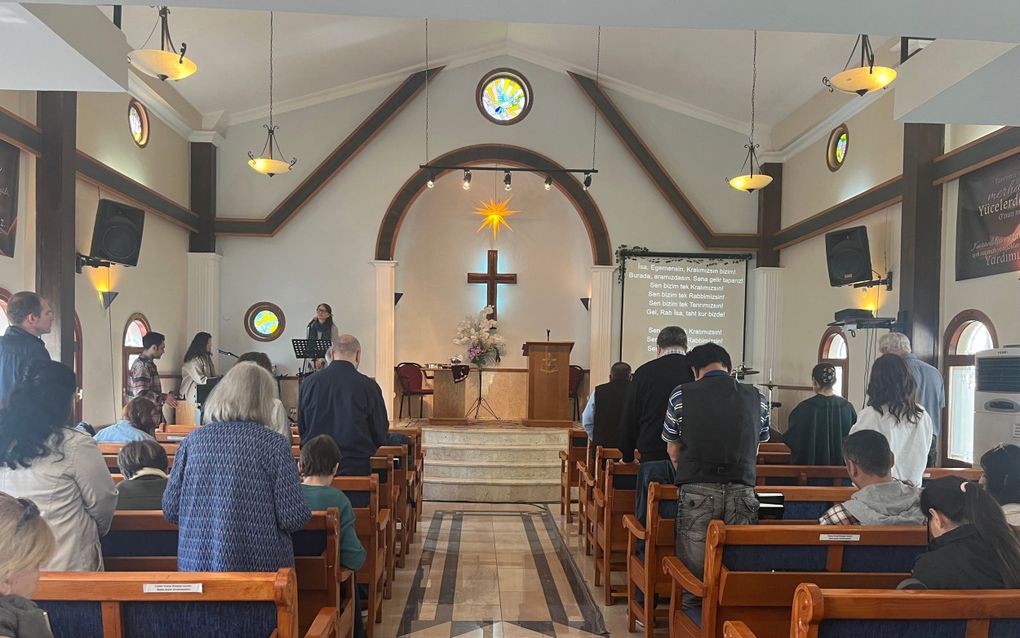
Worship service in a Protestant church in Turkey. Photo RD
Southern Europe
Turkish Protestantism is young and growing fast. In the past 60 years, the number of Turkish Protestants in the country increased from practically zero to more than 10,000. For years, Dr James Bultema searched for an explanation. He found it in a correlation of several fertile conditions.
How is it possible that Turkish Protestantism has grown so rapidly in a short time while the country's culture is so strongly Islamic? Prompted by that question, American pastor Bultema (62), who works in Turkey, began his research almost 20 years ago. Prompted by the death of a well-known missionary, Bultema realised that the stories of the early days were beginning to die out. And that while hardly anything had been written about the origins of the Turkish Protestant movement.
Over the years, Bultema interviewed 107 people, especially missionaries and converts, did historical research and applied data analysis. It culminated in a dissertation that he successfully defended on September 3 at the Evangelical Theological Faculty Leuven, with German missiologist Prof Christof Sauer as supervisor.
James Bultema
Dr James Bultema (1962) is internationally oriented: he grew up in the United States, is a pastor in Turkey, received his PhD in the Belgian city of Leuven earlier this month and has Dutch roots.

His grandfather was Harke Bultema (1884-1952). He emigrated as a young man in 1901 from the Dutch town of Valom to the United States. His son John (1923-2017), James' father, served on two US submarines during World War II, owned a towing and dredging company and travelled the world several times.
His grandfather's preaching and his father's international interest came together in James Bultema. In 1990, with his wife Renata and the eldest of their three children, he was sent as a pastor to Turkey by the El Montecito Presbyterian Church in Santa Barbara, California. There, he worked for six years in Istanbul at the International Union Church, which meets in the Holland Chapel. Since 1996, Bultema has lived in the southern coastal city of Antalya. Here, he founded St. Paul Cultural Centre (SPCC), a Protestant church centre.
How fast did Protestantism grow between 1961 and 2016, and what do you base those numbers on?
"In 1961, shortly after Turkey's new constitution with religious freedom, the first foreign Protestant missionaries arrived. They then met two Turkish Protestant believers, both of whom had been converted outside their home country. From then on, Turkish Protestantism began to grow.
I found in my research that Protestantism then grew by 14.5 per cent per year until 2009. That's an impressive rate. By 2023, S. Ministries, a reliable organisation that wishes to remain anonymous, counted nearly 10,000 Protestants, almost all of whom have a Turkish Muslim background.
The 10,000 figure is still low, in my opinion. There are also Turkish Protestant Christians who are in other Christian denominations –Roman Catholic or Orthodox– and who are therefore left out of the picture in that count. In total, I think there are as many as 12,000 to 13,000 Turkish Christians with a Muslim background."
Free
In his thesis, Bultema identifies four factors that facilitated the enormous growth of Turkish Protestantism. First, there was just enough religious freedom in the country to allow that growth. Hence the title of Bultema's thesis: "Free enough to grow".
The second factor concerns concerted missionary activities by foreign and Turkish Protestants. When the number of Turkish Protestant converts began to outnumber foreign Protestants from the 1990s onwards, Turks themselves were now the most effective evangelists. Third, Bultema describes how conversion processes were stimulated by favourable environmental factors.
The fourth factor in your research concerns "a structure of plausibility" that fostered the growth of Protestantism. What do you mean by this?
"It is then about conditions and circumstances that help the movement grow. I see these at four levels.
First, explicitly defining themselves as Turkish-protestant gave converts a way to articulate their own identity. Most converts grew up thinking that to be Turkish is to be Muslim. If they considered becoming Christians, they did not want to lose their sense of belonging to Turkish culture and to their families. Turkey is much more of a community culture than, say, individualistic America.
Second, local Protestant communities helped converts understand the Christian faith and mould their character to Christ.
The third factor is institutional: Christianity is maintained through sources, leaders, and preachers who teach and through symbols such as the cross and Holy Communion.
Fourth, existing churches in Turkey –the Armenian Orthodox Church, the Greek Orthodox Church, the Ecumenical Patriarchate– have accepted the Turkish Protestant movement. For example, they invite Protestants to ceremonies. That recognition as a viable church has greatly strengthened Protestantism."
"Protestant": an invention of the police
The Turkish Protestant movement did not initially call itself that, but identified itself as 'Mesih İnanlıları': followers of the Messiah. This changed in 1986, courtesy of the police, mind you. Dr James Bultema mentions the remarkable incident in his dissertation.
Turgay, a Turkish Protestant pastor of Muslim origin, was questioned by police. The officers advised him to choose a name for his faith that is already known as a Christian movement. "Followers of the Messiah" sounds too unfamiliar and that arouses suspicion, the officers explained to Turgay. "You are not Orthodox, not Catholic. Protestants are not there yet, you can use that name."
Turgay took the advice, and so the first" Protestan Kilisesi": Protestant church was formed in Istanbul. Congregations in other places adopted that name, and so the movement became known as Protestant in Turkey.
"Turks distrust everything they don't know,' Bultema explains. "That's why the house church model doesn't work in Turkey either. On the contrary, you should not meet in private meetings at home –after all, that's where previous coups also started– but in public buildings. Then people at least know what you are doing, is the thought."
The umbrella name Protestant is broad: it includes Calvinists, Arminians, Anglicans, Charismatic Christians, Lutherans and Baptists, says Bultema when asked. "I do think the majority have a Reformed background; that is, they believe that you cannot lose your faith."
Do you expect the growth of Turkish Protestantism to continue in the coming years?
"We don't know that. But if this growth rate continues, there could be a million Turkish Protestants by 2050. However, it is true that in the beginning, a movement often grows fast through evangelism. Later, more energy usually goes into caring for the existing community and problems that arise in it, so growth slows down."
You interviewed several Turkish Protestant converts for your research. What struck you about them?
'"Conversion processes of Turkish Muslims to Protestantism were always influenced by several interdependent factors. Social and institutional issues often played a bigger role than in conversions in Western countries. Think of a Protestant friend who helps you along or a church service you attend.
But individual events also mattered. One man, now a well-known Turkish Protestant pastor, read in the Bible Romans 5:8: "Christ died for us while we were still sinners." That verse touched his heart, and he answered it with faith.
Circumstances also played a role, such as terrible illness. In research, I call this contingency, but we Reformed Christians would call this God's providence."
Foreign Christians are particularly at risk
After a coup in 1961, a new constitution was adopted in Turkey, which guaranteed human rights such as freedom of religion, says Dr James Bultema. Hence, that is when the growth of Turkish Protestantism began. A new coup and constitution in 1982 formally meant less freedom for religious minorities such as Christians, but in practice it actually increased, as Turks were now less reserved towards dissenters.
So, there is no fierce persecution against Christians in Turkey yet. Nevertheless, the European-Asian country ranks 50th on Open Doors' Christian persecution rankings. 'Converts are pressured by their families and communities to return to Islam,' according to the website of the organisation for persecuted Christians.
Between 2001 and 2009, there was an anti-Christian campaign, Bultema says. "That was mainly nationalist-inspired. And Islam is part of the Turkish national identity." In 2007, three Turkish Christians were murdered. "There were ultra-nationalists behind that." That nationalism still causes Turks to be "cautious and suspicious of Christians, although not so much hostile anymore".
Although there is a perception that Turkish churches cannot register, Bultema says this is not a major problem. "To be registered as an official church building, you have to meet the criteria for a mosque, and not one church does that. Meanwhile, churches do have legal personalities, for example, as associations or foundations. This allows you to advertise and collect."
The category experiencing the most problems in practice are Christians from abroad, such as missionaries and theological teachers. Especially since the failed coup in 2016, this has become worse, Bultema points out. "After the coup, American missionary Andrew Brunson from Izmir was arrested. In the years that followed, more than 300 international missionaries had to leave the country." For this, the Turkish government uses two legal provisions: code N-82 for foreigners who are not allowed to enter without authorisation and code G-87 for those who pose a danger to the country's general security. Even Bultema himself just "hopes and prays" every time he stays abroad that he will be allowed to return, he says.
Remarkably, the pastor is not disheartened by the opposition of foreign Christians. "Since around the year 2000, Turkish Protestantism became more and more a self-sustaining movement. Missionaries are no longer leaders; they are only helpers. In China, when foreign missionaries had to leave in 1949, the Christian movement really began to grow. Missionaries can lay the foundation, but Turkish Christians themselves will drive the Protestant movement forward."
This article was translated by CNE.news and published by the Dutch daily Reformatorisch Dagblad on September 28, 2024
Related Articles

